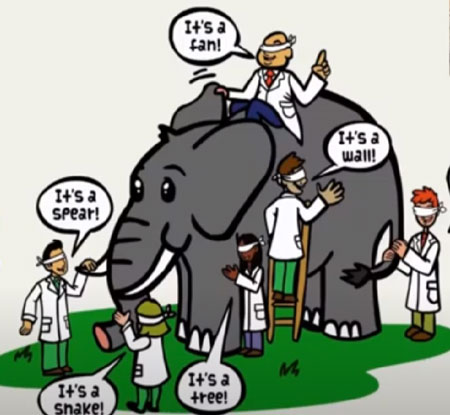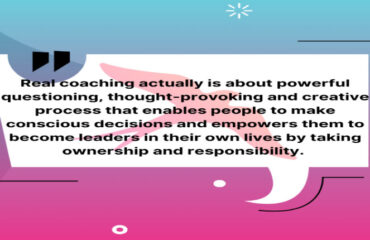Keeping up with the pace of technology and advancement is very challenging today. Hence, companies realize the importance of coaching their teams and the skills to fuel their performance and engagement. Accelerating a coaching culture in a workplace enables workers to develop their abilities, leading to sustained high performance. It offers knowledge, skills, and opportunities to work in a safe environment.
Ro Gorell, a renowned coach and author, participated in the Coaching Culture Circle Conference and stressed on the significance of team coaching, emphasizing the core role of a team coach. According to her, “the core role of a team coach includes creating team bonding, helping develop hidden potential in the team, serving as team’s backbone, enabling teams to work through common challenges, keeping the team member’s enthusiasm high and promoting collaborating among team members, bringing the team members to the expected level, holding a space where the team can identify and work on the making improvements using effective questions and interventions to support raising awareness and listening, empowering and clearing roadblocks.”
Diving further into details, here are these roles of a team coach explained in detail:
Table of Contents
- Introduction to Team Coaching
- The Role of Team Coaching in Building a Coaching Culture
- Key Benefits of Team Coaching for Organizations
- Best Practices for Effective Team Coaching
- Measuring the Impact of Team Coaching
- How to Integrate Team Coaching into Your Organization
- Conclusion: Fostering Long-Term Success through Coaching
What is the core role of a team coach?
- To create team bonding: A good team coach encourages teamwork. They encourage relying on one another for comments and feedback. They help build team spirit amongst coachees to fulfill goals better.
- To help develop hidden potential in the team: Coaches equip every team member to work independently and keep the organization operating effectively simultaneously. The coaching team member also helps them learn to advance their skill sets and develop a healthy workplace culture, which can help them reach their individual and organizational goals.
- To serve as the team’s backbone: A coach has the foresight to witness the best of a person and coach processes. A good coach is patient, persistent, and the team’s backbone. They help initiate new ideas and research employees’ long-term skills that can impact team members’ overall performance.
- To enable teams to work through common challenges: A good coach understands the situation and rapidly works in response to changes. If an individual finds a topic challenging, a good coach starts a two-way conversation to recognize the challenge so team members can develop strategies to overcome them. A good coach doesn’t spoon-feed the employees but works for their betterment by devising new methods to learn new skills and put them to use. The coach works on recognizing the challenges and working together to find solutions. Team members get more engaged in the procedure when they participate more in the action plan.
- Giving them positive feedback or constructive comments reaffirms expectations. For instance, if you’re coaching a team towards professional development, you can pay attention to their skills and mark ways they’ve made progress. This will inspire them to improve and make progress.
- To bring the team member to the expected level: As a coach, it is important to outline the company’s vision, expectations, and what your coaching plans to accomplish for every individual member of a team. This way, coaches can prepare their team for the challenges ahead and make them perform as expected. It further prepares the team for possible challenges and growth and increases their chances for positive results.
- To hold a space where the team can identify and work on making improvements using effective questions and interventions to support raising awareness: Asking the feedback from team members will make them actively participate in the coaching process. You can ask them about the areas where they have seen progress and how their abilities fit the organizational goals. This will help them become more interactive and engaging.
- To listen and empower and clear roadblocks: A good coach knows that sometimes it may be difficult for the members to grasp concepts. Hence, listening to the employees and understanding why they find a particular topic challenging is important. A good coach commences a two-way conversation to empower employees and develop strategies to clear roadblocks.
While a team coach makes an effort to coach employees individually to perform efficiently in a group, this definitely brings out the question about the importance of team coaching. If you’re wondering why companies give priority to team coaching, then here are your reasons:
Why team coaching?
When you go for individual coaching, you’re actually helping the person know their strengths and weaknesses and recognize the problems that prevent them from being their best. But when the individual returns to his desk, they face the pressure of the system for which they are unprepared.

According to “When you blindfold 4-5 people and ask them to touch an elephant, they will come with their own perspective! Though none of them are wrong, they can only recognize the objective and provide a better answer when they collaborate and come together as a team.”
When working in a system, you’re working under supervision. This is where team coaching enters. It helps an individual prepare to work in a procedure under peer pressure and leadership pressure with consistent monitoring. It helps one learn to work at individual, team, and organizational levels.
Coaching a team is like coaching a system. You can coach members about the system individually, but individual and team coaching working together is a great concept.
How does team coaching work?
According to Joseph O’Connor and Andrea Lages, “Coaching is a form of process consultation where the coach’s main task is to help clients understand their way of generating problems, not to solve them.”
A team coach doesn’t consult or give advice. Instead, they offer a process consultancy approach. So, rather than the consultant going as an expert, they enter as the helper here. The whole idea is to help co-create and co-develop the solutions through extended discovery and help them develop their solutions.
Whether individual coaching or team coaching, it is all about co-creating or helping individuals strengthen themselves, find ways to overcome challenges and look for solutions.
Coaching isn’t about telling a team to perform according to the coach. If you’re forcing answers or processes on the team, it is not coaching. It will never promote a coaching culture.
Of course, the pandemic and consistent technological advancement are forcing companies to get obsessed with a linear process. But if the companies are excessively obsessed with adopting a linear coaching culture, it is all about adapting to the process. If you, as a company, are facing this situation, you’ve not done much discovery work.
A growing body of research backs the positive effects of team coaching. A study with a prominent U.K. retailer revealed three key factors that led to enhancements in individual and team development, team effectiveness, and team performance:
- The teams achieved alignment in their purpose, values, beliefs, identity, and collective goals.
- The groups fostered a higher level of psychological safety, enabling team members to be more open, honest, and vulnerable and provide constructive feedback to one another.
- The teams actively shared learnings and best practices.
After knowing how team coaching works, it is essential to get familiar with the basics. What does it take for a team to make decisions and get things done?
Team coaching- the basics:
- How effective is the team performing? Are the members of the team performing up to the mark?
- Are they experiencing hindrances? What is stopping them from being their best? All teams have their good and bad. So, a coach helps to enhance their strengths and overcome their weaknesses. An understanding of barriers is essential.
- Do they have a clear purpose? Recognizing the purpose of their existence is very important. What is the objective of being grouped together?
- What kind of relationship do they enjoy, within the team, with clients? What type of relationship does a member have with one another? Are they open with their leader? Do they speak confidently with their clients? Are they aware of what the stakeholders think about them?
- Do the teams perform as per the expectation? Does the team deliver results as expected? Are they offering their best, or do they lack?
- Do they apply their coaching learning? Merely learning in the coaching culture is not correct; it is all about when you practice your learning in real time.
Promoting team coaching helps establish a well-outlined coaching culture. It helps create a safe environment where individuals are not scared to share their experiences and issues. It helps them strike a conversation and be open to the challenges they are facing and find solutions together as a team.
So, how does team coaching contribute to a real team?

It helps teamwork interdependently
Team coaching plays a crucial role in promoting interdependent teamwork. Through the guidance and support of a coach, team members learn to collaborate effectively, rely on one another’s strengths, and work together towards shared goals. By fostering a sense of interdependence, team coaching enhances communication, coordination, and synergy within the team. This leads to improved cooperation, increased productivity, and the ability to tackle complex challenges collectively. Team coaching empowers teams to leverage their collective intelligence and achieve tremendous success through collaborative efforts.
It helps teams come up with a shared goal and purpose
Team coaching is vital in helping teams establish shared goals and a common purpose. Through the guidance of a coach, team members gain clarity on their collective mission, values, and beliefs, aligning their efforts toward a unified vision. By exploring and defining their shared purpose, teams develop stronger cohesion and motivation. This shared goal acts as a driving force, bringing the team together and providing a clear direction for their actions. Team coaching facilitates identifying and articulating a common purpose, fostering a greater sense of commitment, focus, and collaboration among team members.
It offers shared responsibilities
Team coaching is instrumental in promoting shared responsibilities within a team. By engaging in team coaching sessions, team members learn to take ownership and accountability for their actions and outcomes collectively. The coach facilitates discussions and activities, encouraging collaboration, communication, and trust among team members. Through this process, team members develop a shared understanding of their roles and responsibilities, fostering a sense of shared commitment toward achieving team objectives. Team coaching also helps identify and address any gaps or overlaps in responsibilities, ensuring a balanced distribution of tasks and promoting a culture of mutual support. As a result, team members become more proactive in collaborating, supporting one another, and working towards shared goals, leading to increased team effectiveness and performance.
Conclusion
Ultimately, coaching is not about diagnosing problems and offering tools and solutions. It is about partnering with the team members to find out what they want to discover, create an experience to help them find their inner strengths and sources, and arrive at their answers based on what they think will be a sustainable change in the performance of the team.
It is about accelerating a coaching culture by creating a safe and supportive environment where the team members feel comfortable sharing their ideas and thoughts. It is about celebrating team progress in embracing a coaching culture, evaluating the effectiveness of the coaching initiatives, and adapting the right coaching approach. Over time, this will contribute to an overall organizational coaching culture, where coaching becomes a natural part of how teams operate and thrive.















